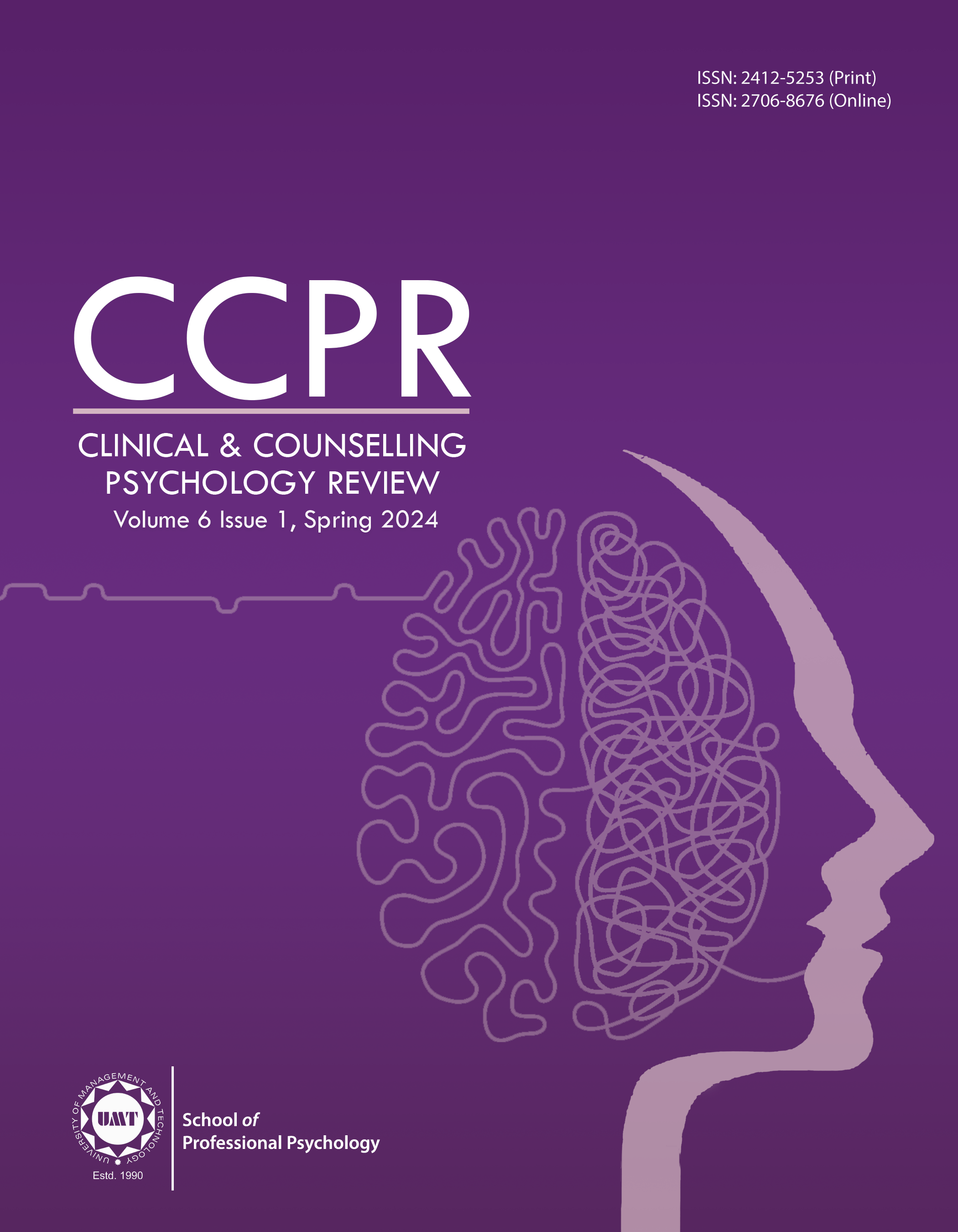Perfectionism, Academic Procrastination and Psychological Distress in University Students
Abstract
 Abstract Views: 0
Abstract Views: 0
The present study aimed to investigate the relationship between perfectionism and academic procrastination and psychological distress in undergraduate university students. It was hypothesized that maladaptive perfectionism and academic procrastination are likely to predict psychological distress. Further aim of the study was to determine the mediating role of academic procrastination in the relationship between maladaptive perfectionism and psychological distress in undergraduate university students. A correlational research design was employed, using a purposive sampling technique to collect online data. The sample comprised of 244 male and female undergraduate students from both public and private sector universities. Assessment tools included the Almost Perfect Scale- Revised (APS-R), Procrastination Assessment Scale-Students (PASS) and Depression, Anxiety and Stress Scale (DASS-21) were used to measure perfectionism, academic procrastination and psychological distress respectively. The data were analyzed by applying descriptive statistics, reliability analysis, Pearson product correlation, multiple hierarchal regression and mediation analysis. The results showed that maladaptive perfectionism and academic procrastination were positively correlated with psychological distress, whereas adaptive perfectionism had no significant relationship with psychological distress. Moreover, maladaptive perfectionism and academic procrastination emerged as significant positive predictors of psychological distress among undergraduate university students. The main findings of mediation analysis revealed that academic procrastination partially mediated the relationship between maladaptive perfectionism and psychological distress. The result was discussed in the light of previous literature, theoretical and cultural background.
Downloads
References
Abid, A., Jan, A., Khan, I. U., Zeb, A., & Ahmad, M. (2021). Role of parental socioeconomic status on their children’s education at district Mardan of Khyber Pakhtunkhwa, Pakistan. Geografia, 17(2), 93–101. https://doi.org/10.17576/geo-2021-1702-08
Athulya, J., Sudhir, P. M., & Philip, M. (2016). Procrastination, perfectionism, coping and their relation to distress and self-esteem in college students. Journal of the Indian Academy of Applied Psychology, 42(1), 82–91.
Belay, A. S., Guangul, M. M., Asmare, W. N., & Mesafint, G. (2021). Prevalence and associated factors of psychological distress among nurses in public hospitals, Southwest, Ethiopia: A cross-sectional study. Ethiopian Journal of Health Sciences, 31(6), 1247–1256. https://doi.org/10.4314/ejhs.v31i6.21
Beutel, M. E., Klein, E. M., Aufenanger, S., Brähler, E., Dreier, M., Müller, K. W., Quiring, O., Reinecke, L., Schmutzer, G., Stark, B., & Wölfling, K. (2016). Procrastination, distress and life satisfaction across the age range–a German representative community study. PLOS ONE, 11(2), Article e0148054. https://doi.org/10.1371/journal.pone.0148054
Bieling, P. J., Summerfeldt, L. J., Israeli, A. L., & Antony, M. M. (2004). Perfectionism as an explanatory construct in comorbidity of axis I disorders. Journal of Psychopathology and Behavioral Assessment, 26, 193–201. https://doi.org/10.1023/B:JOBA.0000022112.27186.98
Blankstein, K. R., & Dunkley, D. M. (2002). Evaluative concerns, self-critical, and personal standards perfectionism: A structural equation modeling strategy. In G. L. Flett, & P. L. Hewitt (Eds.), Perfectionism: Theory, research, and treatment (pp. 285–315). American Psychological Association.
Butt, F. M. (2010). The role of perfectionism in psychological health: A study of adolescents in Pakistan. Europe’s Journal of Psychology, 6(4), 125–147. https://doi.org/10.5964/ejop.v6i4.227
Chalfant, P. H., Heller, P. L., Roberts A., Briones, D., Aguirre-Hochbaum, S., & Farr, W. (1990). The clergy as a resource for those encountering psychological distress. Review of Religious Research, 31(1), 305–313. https://doi.org/10.2307/3511620
Constantin, K., English, M. M., & Mazmanian, D. (2018). Anxiety, depression, and procrastination among students: Rumination plays a larger mediating role than worry. Journal of Rational-Emotive & Cognitive-Behavior Therapy, 36(1), 15–27. https://doi.10.1007/s10942-017-0271-5
Doyle, I., & Catling, J. C. (2022). The influence of perfectionism, self-esteem and resilience on young people’s mental health. The Journal of Psychology, 156(3), 224–240. https://doi.org/10.1080/00223980.2022.2027854
Ellis, A., & Knaus, W. J. (1979). Overcoming procrastination. Signet.
Eum, K., & Rice, K. G. (2011). Test anxiety, perfectionism, goal orientation, and academic performance. Anxiety, Stress, & Coping, 24(2), 167–178. https://doi.org/10.1080/10615806.2010.488723
Farran, B. (2004). Predictors of academic procrastination in college students. Dissertation Abstracts International: Section B: The Sciences and Engineering, 65(3-B), Article e1545.
Fedewa, B. A., Burns, L. R., & Gomez, A. A. (2005). Positive and negative perfectionism and the shame/guilt distinction: Adaptive and maladaptive characteristics. Personality and Individual Differences, 38(7), 1609–1619. https://doi.10.1016/j.paid.2004.09.026
Flett, G. L., & Hewitt, P. L. (2002). Perfectionism and maladjustment: An overview of theoretical, definitional, and treatment issues. In G. L. Flett, & P. L. Hewitt (Eds.), Perfectionism: Theory, research, and treatment (pp. 5–31). American Psychological Association. https://doi.10.1037/10458-001
Hewitt, P. L., & Flett, G. L. (1991). Dimensions of perfectionism in unipolar depression. Journal of Abnormal Psychology, 100(1), 98–101. https://doi.10.1037/0021-843X.100.1.98
Hofstede, G. (2001). Culture's consequences: Comparing values, behaviors, institutions and organizations across nations. Sage publications.
James, K., Verplanken, B., & Rimes, K. A. (2015). Self-criticism as a mediator in the relationship between unhealthy perfectionism and distress. Personality and Individual Differences, 79(1), 123–128. https://doi.10.1016/j.paid.2015.01.030
Johnson, D. P., & Slaney, R. B. (1996). Perfectionism: Scale development and a study of perfectionistic clients in counseling. Journal of College Student Development, 37(1), 29–41.
Kawa, M. H., & Shafi, H. (2015). Evaluation of internet addiction and psychological distress among university students. International Journal of Modern Social Sciences, 4(1), 29–41.
Kawamura, K. Y., & Frost, R. O. (2004). Self-concealment as a mediator in the relationship between perfectionism and psychological distress. Cognitive Therapy and Research, 28(2), 183–191. https://doi.10.1023/B:COTR.0000021539.48926.c1
Lovibond, P. F., & Lovibond, S. H. (1995). The structure of negative emotional states: Comparison of the depression anxiety stress scales (DASS) with the Beck depression and anxiety inventories. Behavior Research and Therapy, 33(3), 335–343. https://doi.org/10.1016/0005-7967(94)00075-U
Madigan, D. J. (2019). A meta-analysis of perfectionism and academic achievement. Educational Psychology Review, 31(1), 967–989. https://doi.10.1007/s10648-019-09484-2
March-Amengual, J., Badii, I. C., Casas-Baroy, J., Altarriba, C., Company, A. C., Pujol-Farriols, R., Baños, J., Galbany-Estragués, P., & Cayuela, A. C. (2022). Psychological distress, burnout, and academic performance in first year college students. International Journal of Environmental Research and Public Health, 19(6), Article e3356. https://doi.org/10.3390%2Fijerph19063356
Maria-Ioanna, A., & Patra, V. (2022). The role of psychological distress as a potential route through which procrastination may confer risk for reduced life satisfaction. Current Psychology, 41(5), 2860–2867. https://doi.org/10.1007/s12144-020-00739-8
Missildine, W. H. (1963). Your inner child of the past. Simon & Schuster.
Naz, S., Hassan, G., & Luqman, M. (2021). Influence of perfectionism and academic motivation on academic procrastination among students. Journal of Educational Sciences & Research, 8(1), 13–20.
Nounopoulos, A., Ashby, J. S., & Gilman, R. (2006). Coping resources, perfectionism, and academic performance among adolescents. Psychology in the Schools, 43(5), 613–622. https://doi.10.1002/pits.20167
Onwuegbuzie, A. J., & Jiao, Q. G. (2000). I’ll go to the library later: The relationship between academic procrastination and library anxiety. College & Research Libraries, 61(1), 45–54. https://doi.10.5860/crl.61.1.45
Park, Y., Heo, C., Kim, J. S., Rice, K. G., & Kim, Y. H. (2020). How does perfectionism affect academic achievement? Examining the mediating role of accurate self‐assessment. International Journal of Psychology, 55(6), 936–940. https://doi.org/10.1002/ijop.12659
Riaz, S., & Saif, A. (2017). Relationship between academic procrastination and stress: Mediating role of mindfulness among university students. Pakistan Journal of Languages and Translation Studies, 74(1), 74–86.
Rice, K. G., & Ashby, J. S. (2007). An efficient method for classifying perfectionists. Journal of Counseling Psychology, 54(1), 72–85. https://doi.org/10.1037/0022-0167.54.1.72
Sagar, S. S., & Stoeber, J. (2009). Perfectionism, fear of failure, and affective responses to success and failure: The central role of fear of experiencing shame and embarrassment. Journal of Sport and Exercise Psychology, 31(5), 602–627. https://doi.10.1123/jsep.31.5.602
Sheppard, L., & Hicks, R. E. (2017). Maladaptive perfectionism and psychological distress: The mediating role of resilience and trait emotional intelligence. International Journal of Psychological Studies, 9(4), 65–75. https://doi.10.5539/ijps.v9n4p65
Slaney, R. B., Rice, K. G., Mobley, M., Trippi, J., & Ashby, J. S. (2001). The revised almost perfect scale. Measurement and Evaluation in Counseling and Development, 34(3), 130–145. https://doi.10.1080/07481756.2002.12069030
Smith, M. M., Saklofske, D. H., & Yan, G. (2015). Perfectionism, trait emotional intelligence, and psychological outcomes. Personality and Individual Differences, 85(1), 155–158. https://doi.10.1016/j.paid.2015.05.010
Solomon, L. J., & Rothblum, E. D. (1984). Academic procrastination: Frequency and cognitive-behavioral correlates. Journal of Counseling Psychology, 31(4), 503–509. https://doi.10.1037/0022-0167.31.4.503
Stoeber, J., & Otto, K. (2006). Positive conceptions of perfectionism: Approaches, evidence, challenges. Personality & Social Psychology Review, 10(4), 295–319. https://doi.10.1207/s15327957pspr1004_2
Stoltz, K., & Ashby, J. S. (2007). Perfectionism and Lifestyle: Personality differences among adaptive perfectionists, maladaptive perfectionists, and nonperfectionists. Journal of Individual Psychology, 63(4), 414–423.
Tice, D. M., & Baumeister, R. F. (1997). Longitudinal study of procrastination, performance, stress, and health: The costs and benefits of dawdling. Psychological Science, 8(6), 454–458. https://doi.10.1111/j.1467-9280.1997.tb00460.x
Truong, L. (2022). How culture affects perfectionism (Publication No. 28418795) [Doctoral dissertation, The Chicago School of Professional Psychology]. ProQuest Dissertations & Theses.
Ursachi, G., Horodnic, I. A., & Zait, A. (2015). How reliable are measurement scales? External factors with indirect influence on reliability estimators. Procedia Economics and Finance, 20(1), 679–686. https://doi.10.1016/S2212-5671(15)00123-9
Walton, G. E., Hibbard, D. R., Coughlin, C., & Coyl-Shepherd, D. D. (2020). Parenting, personality, and culture as predictors of perfectionism. Current Psychology, 39, 681–693. https://doi.org/10.1007/s12144-018-9793-y
Wang, M. C., Haertel, G. D., & Walberg, H. J. (1993). Toward a knowledge base for school learning. Review of Educational Research, 63(3), Article e249. https://doi.org/10.3102/00346543063003249








